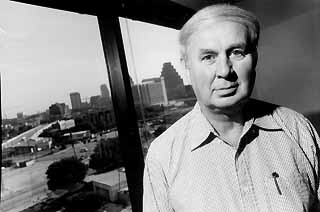Dusting Away the Cobwebs
By Kevin Fullerton, Fri., July 28, 2000

In a real estate market moving as fast as Austin's, one would think that about every lending institution in town would have its hands full of proposals for construction and home-improvement loans. But that hasn't been the case for one, at least: the Austin Housing Finance Corporation. What, never heard of it? One would think the City Council never had either, even though council members comprise the AHFC board of directors. With the bonding authority to raise millions of dollars for apartment construction, home repairs, home-purchasing loans, even the development of new lots, AHFC has the potential to be the friendly developer who puts the needs of low-income residents ahead of profits. Until recently, however, the AHFC behaved as if its services weren't really needed, as if it were just trying to stay out of the private sector's way. The city has never even put AHFC staff on the full-time payroll; employee salaries are paid largely through federal grants from the U.S. Dept. of Housing and Urban Development.
That may be changing, however. Sensing that his meager bag of federal housing assistance grants was becoming increasingly powerless in an economy where the minimum wage is the primary growth industry, city housing office director Paul Hilgers has decided to finally muscle up the city's housing equity arm. In January, Hilgers hired Matthew Powell to take over as AHFC's executive director and get the corporation involved in the business for which it was intended -- channeling private-sector dollars into housing stock accessible to lower-income residents.
"I feel like a Mack Brown who just got a great recruiting class," Hilgers says of his new hire. For the past decade, Powell has been doing in other cities what Hilgers hopes Austin is ready to do -- developing programs that use city funds to attract financing from banks and empowering nonprofit organizations to participate in the housing sector. In Providence and Chattanooga, Powell oversaw the creation of new community development agencies that partnered those cities with banks and builders to revitalize urban neighborhoods. In Chattanooga, Powell's program earned national attention for the high number of properties it improved and developed. Powell's last job, with Gilbane Building Company in New Orleans, was managing a contract to rebuild that city's public housing supply. "You really can't just be a governmentally sponsored housing finance corporation and be totally successful at meeting the needs of your communities," says Powell. "You've gotta go out and get a lot of other partners involved."
Since Powell has come to town, the AHFC has begun to figure much more prominently in the goals of the city's office of Neighborhood Housing and Community Development (NHCD). Federal funds that once flowed directly from NHCD to needy homeowners, first-time homebuyers, or into the occasional revitalization project will now be funneled through the corporation as loan guarantee money to access greater amounts of capital from banks. The downside -- or upside, depending on your perspective -- is that recipients of these new loans will have a greater obligation to repay them than they did in the past. And the policy also perpetuates the housing office's longtime habit of targeting more aid to current or potential homeowners than to renters with less stable incomes. On the other hand, by guaranteeing loans, the AHFC is essentially challenging banks to invest in the fortunes of poorer residents.
"To some degree, our job is to minimize the risk of the private sector investing in the people we want served, and what we've found is that the people we want served are a good investment," says Hilgers.
Powell says we can also expect the AHFC to get a lot more aggressive in the use of tax-exempt bond financing. As a nonprofit, AHFC has the authority to raise limitless bond capital for construction and rehabilitation. AHFC just completed a big year for bonds, financing repairs on nearly 1,000 apartments reserved for low-income tenants, and it's set to be a key player in a brand-new complex in Oak Hill. Next year, the corporation hopes to put up another $35-40 million, perhaps even setting itself up as a developer on big projects in East Austin. Some housing advocates, including Richard Halpin of American Youth Works, say AHFC's involvement in the private sector could precipitate new partnership ventures that create well-planned and accessible housing on a large scale in East Austin.
Powell says its time to shoot for goals just that lofty. "Paul [Hilgers] has an agenda to make AHFC the best community housing organization in the country -- and that's what I want to be a part of," he says.
Got something to say on the subject? Send a letter to the editor.








